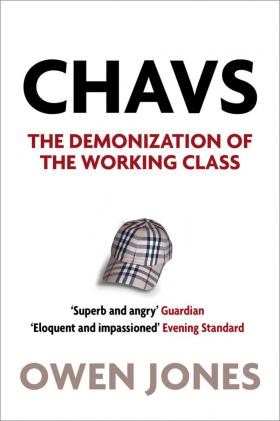Over 30 years of anarchist writing from Ireland listed under hundreds of topics
International
Chavs: The Demonization of the Working Class by Owen Jones
 Released in Summer 2011 and now in its second edition, Chavs is Owen Jones' attempt to help rescussitate debate around class within mainstream outdated concept and political discourse.
Released in Summer 2011 and now in its second edition, Chavs is Owen Jones' attempt to help rescussitate debate around class within mainstream outdated concept and political discourse.
Broadly speaking, it is focused on the fate of working class communities in Britain since the Thatcher era and the disappearance of working class political representation, and puts forward some possible ideas to envision a renewed class politics for today. The book has proven a popular one and has propelled its author's public status as a prominent left-wing commentator, and one of the main voices of initiatives to reclaim the Labour Party as a working class organisation.
Turn off the Red Light: Should we advocate it?
 “In Turn off the Red Light – Should We Advocate It?”, T.J., explores the problems faced by sex workers in gaining recognition by those who normally fight for workers rights and outlines how criminalisation of demand has created new problems in countries where that has been introduced.
“In Turn off the Red Light – Should We Advocate It?”, T.J., explores the problems faced by sex workers in gaining recognition by those who normally fight for workers rights and outlines how criminalisation of demand has created new problems in countries where that has been introduced.
Sex and Sex Work from an Anarcha-Feminist perspective
 In “Sex and Sex Work from and anarcha-feminist perspective”, Leticia looks at the theoretical background to the debate between those who argue for decriminalisation and those who “see sex work (or even sex in general) as violence against women”. She argues that because sex is commodified, sex workers should be treated in the same way as others who engage in exploitative labour.
In “Sex and Sex Work from and anarcha-feminist perspective”, Leticia looks at the theoretical background to the debate between those who argue for decriminalisation and those who “see sex work (or even sex in general) as violence against women”. She argues that because sex is commodified, sex workers should be treated in the same way as others who engage in exploitative labour.
Failing to unveil Capitalism at Occupy - Paulo Freire’s Theoretical Framework
 The Occupy movement may have come into our lives just over a year ago with a bang but it went out months later with a whimper. Cathal uses the benefit of hindsight to look at the phenomenon as it manifested itself on these shores and what anarchists could have done to make it work better. The difficulties as Cathal argues did not lie in making arguments for democracy has been the case in so many other campaigns but in that the occupiers “didn’t see this conception extending to the realm of economic production” and in developing the 99%/1% analysis into a deeper class analysis. Recognising problems with current modes of consciousness raising, he utilises Paulo Freire’s pedagogical framework in an attempt to subject “our own political strategies, methodologies and theories to critical scrutiny”.
The Occupy movement may have come into our lives just over a year ago with a bang but it went out months later with a whimper. Cathal uses the benefit of hindsight to look at the phenomenon as it manifested itself on these shores and what anarchists could have done to make it work better. The difficulties as Cathal argues did not lie in making arguments for democracy has been the case in so many other campaigns but in that the occupiers “didn’t see this conception extending to the realm of economic production” and in developing the 99%/1% analysis into a deeper class analysis. Recognising problems with current modes of consciousness raising, he utilises Paulo Freire’s pedagogical framework in an attempt to subject “our own political strategies, methodologies and theories to critical scrutiny”.
Not Waving but Drowning: Precarity and the Working Class

In ‘Not Waving but Drowning: Precarity and the Working Class’, Mark Hoskins takes a critical look at the idea put forward by some academics and even parts of the anti-capitalist movement that the “precariat” is the revolutionary subject of our epoch. After examining the subjective conditions of the precarious subject today and comparing its objective conditions to those of the working class of the last century, he goes on to explore how these conditions relate to our end goal, a communist society and what lessons that can teach us in our attempt to get there.
Rethinking Class: From Recomposition to Counterpower
 In Paul Bowman’s article ‘Rethinking Class: From Recomposition to Counter-Power’, he poses the question “Is class still a useful idea?” or “should we instead just dispense with it and go with the raw econometrics of inequality?” He draws a line between revolutionary class analysis and universalist utopianism and goes on to explore the history of different ideas of class and the elusive revolutionary subject. After exploring the intersecting lines of class and identity, he poses the challenge that we as libertarians face as we strive to create “cultural and organisational forms of class power [that] do not unconsciously recreate the... hierarchies of identity and exclusion” that are the hallmark of the present society.
In Paul Bowman’s article ‘Rethinking Class: From Recomposition to Counter-Power’, he poses the question “Is class still a useful idea?” or “should we instead just dispense with it and go with the raw econometrics of inequality?” He draws a line between revolutionary class analysis and universalist utopianism and goes on to explore the history of different ideas of class and the elusive revolutionary subject. After exploring the intersecting lines of class and identity, he poses the challenge that we as libertarians face as we strive to create “cultural and organisational forms of class power [that] do not unconsciously recreate the... hierarchies of identity and exclusion” that are the hallmark of the present society.
Revolutionary Organization in the age of Networked Individualism
 The revolutions and revolts that swept the world in 2011 took almost everyone by surprise. One of the first strong attempts to explain why they happened is Paul Mason’s ‘Why It’s Kicking Off Everywhere.’ He argues that “the materialist explanation for 2011...is as much about individuals versus hierarchies as it is about rich against poor.” By far the most provocative element of his book is the idea that communications technology, in particular the internet, is transforming the way people behave and that a significant contribution to the revolts of 2011 lie in these changes. If he’s right it had profound consequences for the form and structure of revolutionary organisations including anarchist ones.
The revolutions and revolts that swept the world in 2011 took almost everyone by surprise. One of the first strong attempts to explain why they happened is Paul Mason’s ‘Why It’s Kicking Off Everywhere.’ He argues that “the materialist explanation for 2011...is as much about individuals versus hierarchies as it is about rich against poor.” By far the most provocative element of his book is the idea that communications technology, in particular the internet, is transforming the way people behave and that a significant contribution to the revolts of 2011 lie in these changes. If he’s right it had profound consequences for the form and structure of revolutionary organisations including anarchist ones.
This article also availale on audio & video, see end.
An anti-capitalist and environmentalist perspective on the Euro crisis

Paul Bowman gives a 40 minute presentation on the Euro as a moment of the internationalisation of capital and looks for a way of dealing with the crisis that goes beyond the alternative models of capital being argued for by the left. If the height of a crisis is not the moment to raise a discussion of an anti-capitalist alternative then when is? Beyond this he also warns against the stagest approach much of the left has adopted where the economic crisis is to be addressed first by a demand for growth and the environmental crisis ignored till later.
What is the Fiscal Compact: Smoke & Mirrors
 As the flames from the latest round of rioting in Greece die down, the incapacity of the mainstream media to tell the story of the current Eurozone crisis leaves us as much in the dark as before the Molotov’s lit up the nightly news.
As the flames from the latest round of rioting in Greece die down, the incapacity of the mainstream media to tell the story of the current Eurozone crisis leaves us as much in the dark as before the Molotov’s lit up the nightly news.
Neoliberalism & the restructuring of Education
 In mid-August, Labour Minister for Education Ruairi Quinn announced both further increases to the “registration fee”, which currently stands at €2000, and the return of tuition fees, which will be payable at point-of-entry, for third level education. Coupled with the massive cuts already to the grants system, this will make it prohibitively expensive for many students to enter and complete third level education, and impose a substantial financial burden on those that do. The implications of this will be further falls in the standard of living of ordinary families and increased indebtedness for young people as they begin their adult lives. For many prospective mature students, their hopes of getting back to education will be ruined.
In mid-August, Labour Minister for Education Ruairi Quinn announced both further increases to the “registration fee”, which currently stands at €2000, and the return of tuition fees, which will be payable at point-of-entry, for third level education. Coupled with the massive cuts already to the grants system, this will make it prohibitively expensive for many students to enter and complete third level education, and impose a substantial financial burden on those that do. The implications of this will be further falls in the standard of living of ordinary families and increased indebtedness for young people as they begin their adult lives. For many prospective mature students, their hopes of getting back to education will be ruined.

